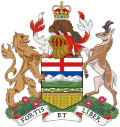Our website is made possible by displaying online advertisements to our visitors.
Please consider supporting us by disabling your ad blocker.
History of Alberta
| This article is part of a series on |
| Alberta |
|---|
 |
| Topics |
| History |
| Politics |
| Timeline of Alberta history |
The province of Alberta, Canada, has a history and prehistory stretching back thousands of years. The ancestors of today's First Nations in Alberta arrived in the area by at least 10,000 BC according to the Bering land bridge theory. Southerly tribes, the Plain Indians, such as the Blackfoot, Blood, and Peigans eventually adapted to seminomadic plains bison hunting, originally without the aid of horses, but later with horses that Europeans had introduced.
Recorded or written history begins with the arrival of Europeans. The rich soil was ideal for growing wheat and the vast prairie grasslands were great for raising cattle. The coming of the railways in the late 19th century led a to large-scale migration of farmers and cattleman from Eastern Canada, the United States, and Europe. Wheat and cattle remain important, but the farms are much larger now and the rural population much smaller. Alberta has urbanized and its economic base has expanded from the export of wheat and cattle to include the export of petroleum as well.
Previous Page Next Page


